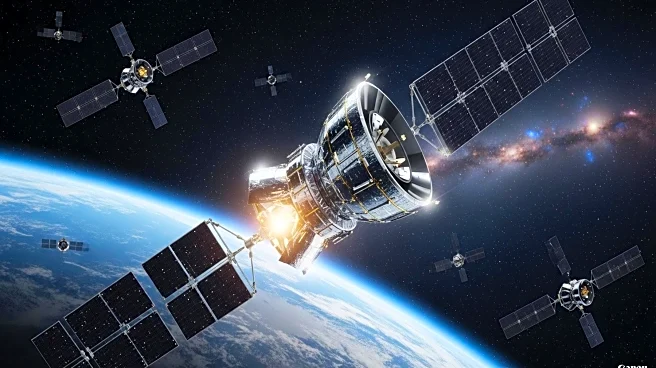What's Happening?
Novaspace, a French space consultancy, has released a report predicting the launch of over 43,000 new satellites within the next decade. This surge in satellite deployment is expected to generate $655 billion in market value through manufacturing and launch services. The report highlights that the majority of these satellites will be commercially operated, yet defense budgets will continue to play a significant role in driving market value. The report also notes that only a small portion of the manufacturing market value is accessible to any manufacturer, with most being 'nationally captive' due to government demand. Additionally, two-thirds of the satellites will be owned or operated by five mega-constellations, including SpaceX's Starlink and Amazon's Kuiper in the U.S., and Guowang and Qinfan in China.
Why It's Important?
The anticipated increase in satellite launches signifies a major shift in the space industry, with implications for both commercial and defense sectors. The defense sector's influence is expected to remain strong, with nearly half of the market value being defense-funded despite representing a smaller portion of satellite volume. This could lead to more companies developing dual-use capabilities to cater to both commercial and defense needs. The proliferation of mega-constellations also suggests a move towards interconnected networks, enhancing global connectivity and orbital complexity. This development could impact various industries, including telecommunications, navigation, and earth observation, by providing more robust and widespread satellite coverage.
What's Next?
As the satellite industry evolves, stakeholders may need to adapt to the changing landscape. Companies might explore vertical integration or dual-use capabilities to capture market value. Governments could increase investments in sovereign satellite constellations to secure national interests. The shift towards decentralized networks may also prompt regulatory changes to address issues such as space traffic management and orbital debris. Additionally, the defense sector's continued influence may drive further militarization of space, potentially affecting international relations and security policies.
Beyond the Headlines
The rapid expansion of satellite networks could raise ethical and legal questions regarding space sustainability and the equitable distribution of orbital resources. The concentration of market value within a few mega-constellations might lead to concerns about monopolistic practices and the accessibility of satellite services for smaller players. Furthermore, the defense sector's dominance could spark debates on the militarization of space and its implications for global peace and security.









